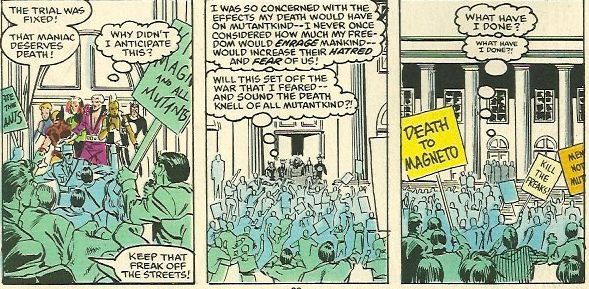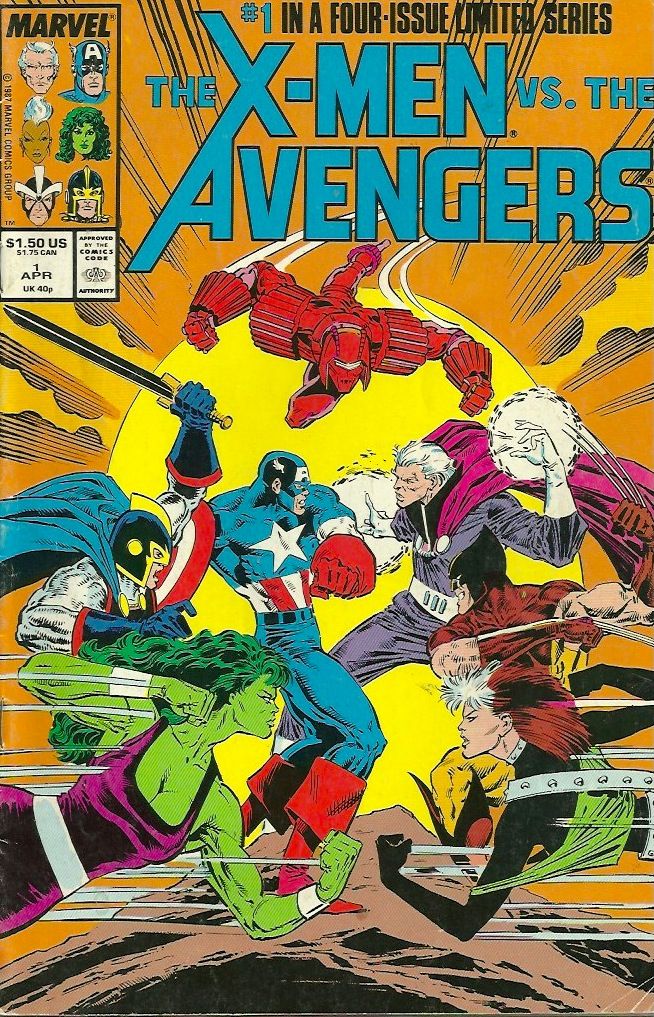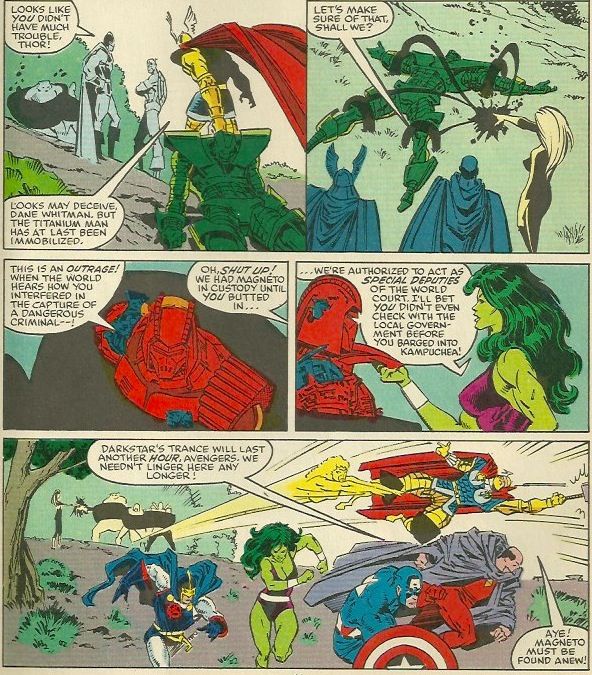A column in which Matt Derman (Comics Matter) reads & reviews comics from 1987, because that’s the year he was born.
The X-Men vs. the Avengers #1-4 (Marvel) by Roger Stern (#1-3), Tom DeFalco (#4), Marc Silvestri (#1-3), Keith Pollard (#4), Josef Rubinstein, Christie "Max" Scheele, and Joe Rosen
25 years before the Avengers tried to take custody of Hope in order to prevent her from mishandling/abusing the power of a threat falling from space, they tried to take custody of Magneto in order to prevent him from mishandling/abusing the power of a threat that had recently fallen from space.
Other than that nutshell plot synopsis, 1987's The X-Men vs. the Avengers has very little in common with 2012's Avengers vs. X-Men, mostly due to the dramatic difference in scope between the two series. XvA (if you'll allow me the shorthand) is a self-contained mini-series that, while it doesn't ignore the continuity of its time, doesn't really affect the greater Marvel Universe's status quo, either. AvX, on the other hand, was a sprawling crossover event meant to dramatically shake up the Marvel U, which mostly just amounted to a bunch of new titles and a few new teams, but that's a discussion for another time and place. There is one other commonality between these books, though, something which makes them each a less enjoyable reading experience than they could and maybe should have been: distracting changes in style due to sudden shifts in creative team. Now, with AvX, this was the plan all along, to produce a series written and drawn by many different contributors, I guess because Marvel thought it was the comicbook equivalent of a supergroup? Whatever the reasoning behind it, that event ended up feeling incredibly disjointed and unfocused from start to finish, which is obnoxious to be sure, but at least it was consistently inconsistent. With XvA, the shift in creators doesn't come until the fourth and final chapter, and the effect is even more jarring and upsetting, since up to that point there'd been a reliable authorial voice and aesthetic driving everything, and a real sense of purpose and progress to the narrative. Much of that is undone in the last issue, and while the story's ending is actually one I find rather interesting, it comes across as wedged in and a little confusing on a first read, since it arrives so suddenly and has such a different tone than everything which preceded it.
The X-Men vs. the Avengers #1-3 were all written by Roger Stern and penciled by Marc Silvestri, a solid pair of collaborators, at least as far as this title is concerned. The story they tell is a pretty simple one, which leaves them with enough room to do some nice characterization with the lineups of both titular teams, as well as the Soviet Super-Soldiers, a group of Russian superheroes who also play a major role in this comic but understandably don't get equal billing. It all begins with chunks of Asteroid M falling to Earth, and the whole world freaking out over the idea that Magneto might use these pieces of his former base to do something malevolent. At the time, Magneto claimed to be one of the good guys, fighting alongside the X-Men rather than against them, but not everyone trusted or believed in his change of heart, so when a reminder of his past atrocities came crashing down from the sky, many felt it was cause for worry. Not only that, it was seen by some as an opportunity to bring Magneto in and try him for his many crimes, including but not limited to causing a volcano to burst out of the middle of a major Russian city. So when Magneto predictably heads to the crash site in an effort to recover technology and who knows what else from his former stronghold, the rest of the heroes in this series converge on him immediately, hoping to arrest, kill, or protect him, depending on which team they're with. The Avengers want to bring Magneto into the World Court so he can be fairly tried, the Soviet Super-Soldiers want to see him pay immediately for the heinous things he's done to their country in the past, and the X-Men want to handle him themselves because mutants like to keep it in the family. So the three teams exchange heated words and eventually come to blows, while Magneto, true to form, tries to evade everybody in pursuit of his own goals.
What Stern does best in this narrative is balancing the action with the conversation, so that every member of every team involved has chances to shine in combat and out. There is some intelligent debate among the heroes, both within each team internally and during arguments between them, about what the best way to handle someone like Magneto really is, and whether or not any of them even have a right to claim custody over him. It's an interesting examination/exploration of superhero jurisdictional issues, with each side providing equally valid reasons as to why they should be responsible for Magneto, and nobody willing to budge. As with most superhero problems, the solution everyone tries over and over is to violence their opponents into submission, but the other thing Stern does quite nicely is to make sure that violence has consequences. Friends fight friends reluctantly, innocent lives are put at risk, Magneto runs away during the chaos of battle, and so on so that every fight has a cost and every time one or more of the superheroes are too stubborn and/or impulsive for their own good, they pay for it.
Silvestri admittedly does slightly better with the action scenes than the talky ones, but the most impressive aspect of his contributions is how effortlessly he seems to handle the immense number of characters. There are some heavily populated scenes along the way, especially when all three teams get together in the same place, but nobody gets the short end of the stick and none of the panels feel crowded. There's no lack of detail on any page, and every character, even the ones in giant suits of robot armor, is expressive in a distinct way that matches their personality. Silvestri's layouts are fairly standard, and he was a new enough talent at the time that his style was fairly reserved and traditional-looking, a standard piece of 80's superhero graphic fiction. But the narrative relies on having the reader care about and connect with all three sides of this conflict, and it is Silvestri's work with the cast that makes that not just possible but unavoidable. They're all given equal attention, depth, and humanity, so that no one ever feels like a less serious or important character than anyone else.
Throughout those first three chapters, then, what goes down is essentially a long-running, globe-spanning hunt for Magneto, with his allies in the X-Men struggling to keep him free while the Avengers and Soviet Super-Soldiers try hard and often to catch him. For his part, what Magneto's after is as simple as it is scary: he wants to use old tech from Asteroid M to telepathically remove by force humanity's prejudice against mutant kind. Apparently this is something he can do, though the details of how it works are never discussed. It doesn't really matter how or even if he might accomplish this, what's great about it is that it's such a perfectly Magneto thing to do, and that he's arrogant and self-important enough to believe it would be a good, righteous act if he pulled it off. With that motive, Magneto becomes the villain of this story, a role that suits him far better than the uneasy hero he's pretending to be, and though he never fully breaks from the X-Men over it, the reader gets to see that, despite his best efforts, he's not as good as he (or anyone else) thinks. As covered by the good sir Brian Cronin in an old Comic Book Legends Revealed, had Stern gotten to wrap up this series his way, Magneto would have exposed his true colors in full and been an official baddie again by the end. I imagine him unifying the various hero teams against him as he tried to brainwash the entire world into loving mutants, but that's pure speculation on my part, and we'll never know precisely how Stern would've concluded things, because it was Tom DeFalco who actually got to write the closing issue.
DeFalco came in to replace Stern after disagreements between Stern and editorial over the ending of the story. So I don't know how much of what happens in The Avengers vs. the X-Men #4 is actually DeFalco's creation and how much was mandated from above, but he's the writer listed, so he gets all the credit and blame.
It's not a bad ending, conceptually speaking, but it feels unearned. First, Magneto suddenly realizes how misguided his eliminate-all-mutant-prejudice goal was, just because when he tries it on Captain America it doesn't stop Cap from wanting to arrest him. That, to me, feels like a misunderstanding of why Magneto wanted to do it in the first place, but staying true to character is set aside so that he can turn himself in and allow himself to be tried in the World Court. This, too, is a tad annoying, because it essentially means that the Avengers win, since a trial is all they wanted from the start. Why hand them such an easy victory and for such a lame reason, especially when the far more exciting option of having Magneto do a full-on heel turn was sitting right there? The trial, then, is remarkably dry, and mostly involves the reiteration of facts that have already been covered in previous issues of this comic, all of which were events from previous issues of other comics, anyway. Then, convinced he's going to be found guilty because the judges of his case hate mutants, Magneto secretly uses his mind-control technology to erase the mutant prejudice from one of the judge's minds, hoping this will lead to an acquittal. Which it does, but in a frustrating way, because the judge who dismisses the charges does so based on an argument he shot down several pages earlier when Magneto's defense attorney tried to make it. So there's a touch of self-contradiction there, though by that point in the issue, expecting anyone to act consistently has pretty much been thrown out the window. Finally, Magneto exits the court, once again free to try and fool himself and the world into thinking he's a good guy now, but what he finds outside is a world even angrier and more anti-mutant than ever. People assume (correctly) the trial was rigged, that there was nothing fair about the verdict, and that Magneto still totally deserves to pay for his crimes. And because he's with the X-Men now, they see him as the face of all mutants, no matter how good they claim to be. There is an angry mob awaiting Magneto when he exits the court, and that is where the series ends, with Magneto having the awful realization that after all of this effort, all he managed to pull off was the exact opposite of his goal.
Like I said, it's not a bad idea for an ending, it's just that it doesn't really mesh with the story leading there. I like the notion that, in the end, Magneto would defeat himself, but there was no momentum in that direction until DeFalco took the wheel and turned the narrative sharply. Up until the final chapter, this was a story about Magneto rediscovering his villainous side, literally in the form of the hunk of Asteroid M he finds, and figuratively in that his endgame was far from noble or just. Then in issue #4, he suddenly becomes a sincere hero again, willing to face the court and take responsibility, only to flip-flop a second time when he brainwashes the judge. I'm not really sure where he ends up on the moral spectrum ultimately, because I'm not convinced the Magneto of the last issue is the same as that of the rest of the series. The Avengers vs. the X-Men #4 feels more like its own Magneto short story than the conclusion of the mini, except of course that the events of that issue tie directly to those of the first three.
Keith Pollard also replaces Silvestri in the final issue, though I'd guess that had more to do with Silvestri becoming the head artist on Uncanny X-Men than any dissatisfaction with his work on the rest of the book. Luckily, the rest of the art team stays the same, so between Josef Rubinstein's finishes and Max Scheele's colors, the visuals don't shift too dramatically. There is a definite noticeable difference, but the gap isn't nearly as wide as that between Stern's writing and DeFalco's.
The biggest bummer about The X-Men vs. the Avengers is that whatever valuable content it provides throughout is tainted by the ill-fitting finale. You might like issues #1-3, and/or you might like issue #4, but they don't really line up with one another, and that's hard to reconcile since they're meant to be a single story. Too bad, then, that two-and-a-half decades later, Marvel couldn't learn the lesson of this series when it came time to pit these two teams against one another again. That lesson being, of course, that it's always better to have a singular creative vision than to try and hodgepodge it with editorial guidance and hope it still makes sense in the end.



